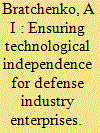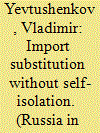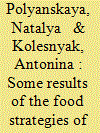|
|
|
Sort Order |
|
|
|
Items / Page
|
|
|
|
|
|
|
| Srl | Item |
| 1 |
ID:
161913


|
|
|
|
|
| Summary/Abstract |
This paper looks at the prospects of tackling key problems of import substitution in the area of information and communication technologies in Russia's defense industrial complex as the basis for ensuring this country's technological sovereignty. The authors suggest a formula of import substitution that is relevant to the defense industry, given the priorities of science-and-technology trends, and quantitative assessment of the degree of trust as a comprehensive indicator of security and technological independence of firmware.
|
|
|
|
|
|
|
|
|
|
|
|
|
|
|
|
| 2 |
ID:
138220


|
|
|
|
|
| Summary/Abstract |
Several years ago, Russia adopted an economic policy that prioritized modernization and innovation-based development. Despite all the difficulties encountered on the way, the Russian government has persevered in pursuing this policy and even strengthened some of its key aspects, primarily in the military-industrial complex.
|
|
|
|
|
|
|
|
|
|
|
|
|
|
|
|
| 3 |
ID:
189308


|
|
|
|
|
| Summary/Abstract |
This article presents a comparative macroeconomic analysis of the results of agricultural policy in the area of food security in Russia. China, and Japan. Russia has a lot more agricultural land - a factor of basic importance in food production - than its eastern neighbors China and Japan. China is the leader in terms of gross agricultural production, especially in cereal crops and grain legumes, stone fruits, berries, citrus fruits and grapes, vegetables, melons and gourds, as well as eggs. With respect to those products, China has complete self-sufficiency, but at the same time, the country experiences shortages in its own production of potatoes, meat, and milk. Japan cannot fully supply its own stone fruits, berries, citrus fruits and grapes, vegetables, melons and gourds, as well as meat and milk. Russia also has a shortage in its production of those products, with the exception of meat, of which it has ample supply. The average Russian citizen does not consume enough vegetables, melons and gourds, as well as milk and dairy products, for which there is a low level of self-sufficiency and economic accessibility in the country.
|
|
|
|
|
|
|
|
|
|
|
|
|
|
|
|
| 4 |
ID:
153466


|
|
|
|
|
| Summary/Abstract |
THE POLITICAL CRISIS in Ukraine that erupted in March 2014 sparked tensions between Russia and its Western partners, with the United States and then the European Union imposing sanctions on Russia that year. The sanctions mainly targeted key Russian banks and energy companies, which were denied access to long-term loans. Russia's defense industry was also sanctioned: the West in effect embargoed exports to Russia of armaments, dual-use goods and materials used in manufacturing weapons, and U.S. and European companies and individuals were prohibited from doing business with major Russian defense companies.
|
|
|
|
|
|
|
|
|
|
|
|
|
|
|
|
|
|
|
|
|